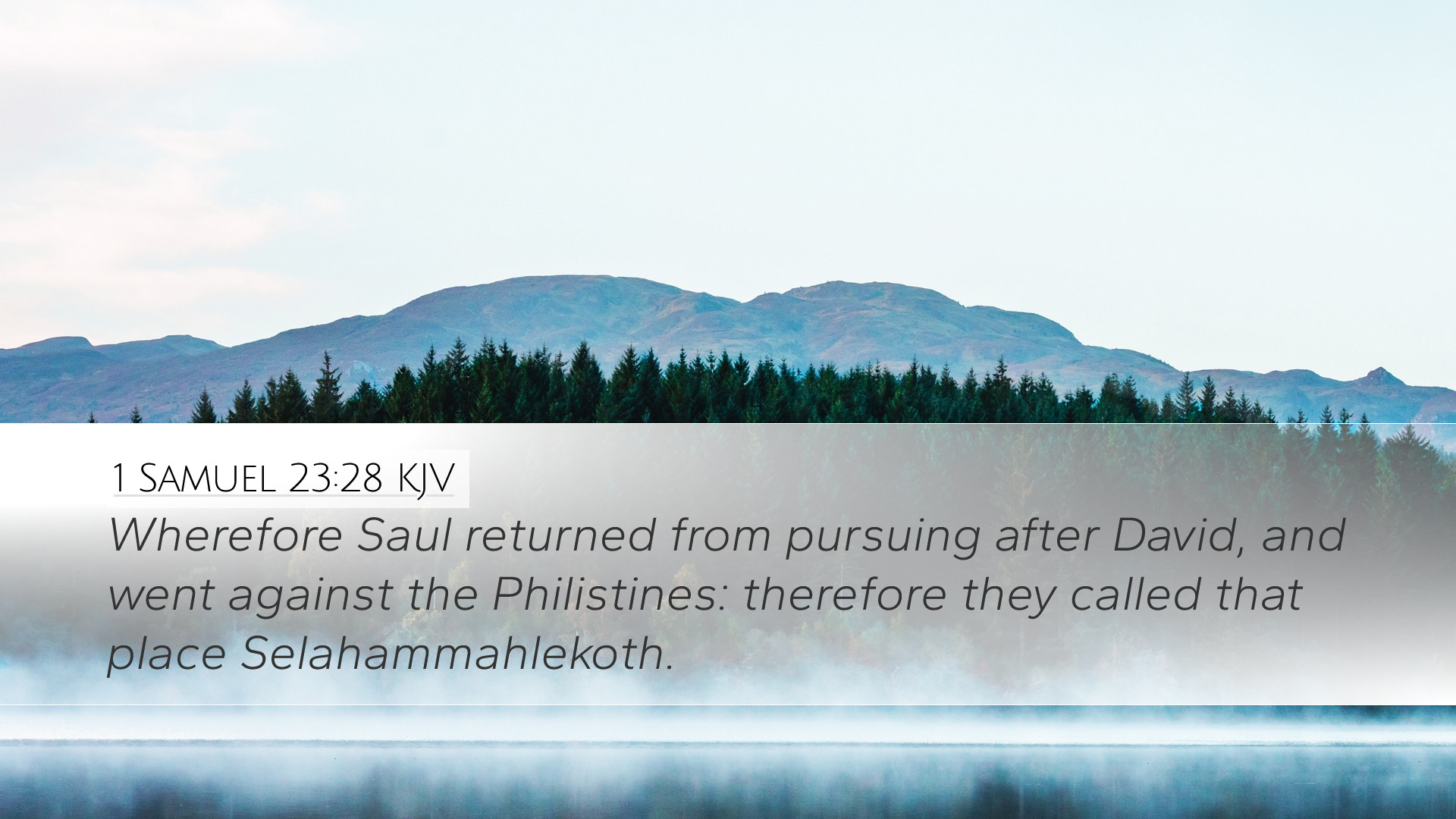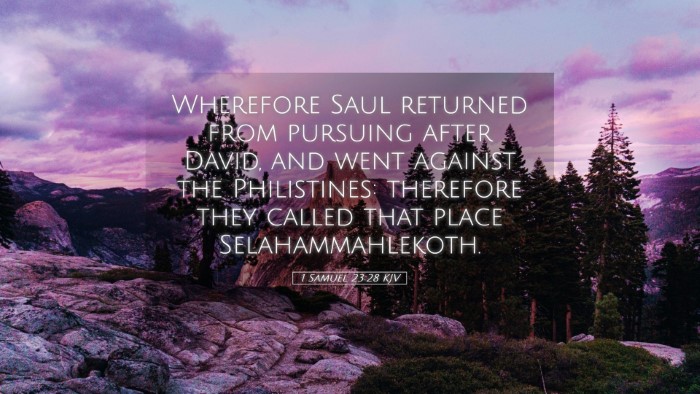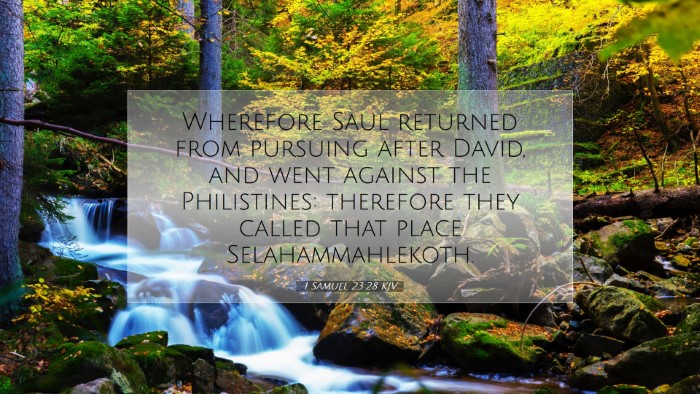Commentary on 1 Samuel 23:28
The verse states: "Wherefore Saul returned from pursuing after David, and went against the Philistines: therefore they called that place Selehhamahlekoth." This verse captures a significant moment in the ongoing conflict between David and Saul, providing fertile ground for exploration in biblical wisdom and theological implications.
Contextual Background
To comprehend the weight of 1 Samuel 23:28, it is essential to understand the narrative context. David is being relentlessly pursued by Saul, who, consumed by jealousy and rage, seeks to eliminate his rival. The threat to David’s life is palpable, as Saul, king of Israel, believes that eliminating David is synonymous with securing his reign.
In this atmosphere of tension, David finds refuge in various places, relying on God’s guidance. Throughout these chapters, we see the role of divine intervention—and this very verse stands as a testament to such providence. It indicates a significant turn in the relentless pursuit when Saul diverts his attention to confront the Philistines, thus granting David a temporary reprieve.
Insights from Matthew Henry
Matthew Henry provides a profound reflection on this verse, emphasizing God’s sovereignty in orchestrating events for the protection of His anointed. In his commentary, he notes the irony of Saul’s preoccupation with David when the warfare with the Philistines looms. Henry suggests that Saul's distraction by the Philistines serves God's purpose—providing David with the opportunity to escape.
Furthermore, Henry points out that the name "Selehhamahlekoth" encapsulates the moment of deliverance, symbolizing God’s power to intervene in the lives of the faithful. This reflects a broader theme within Scripture that highlights God's providence in times of adversity. The shift of Saul's focus serves as a fascinating case study in divine timing and purpose.
Contributions from Albert Barnes
Albert Barnes offers critical insights into the geographical and historical implications of this verse. He elucidates the translation of "Selehhamahlekoth," which can be interpreted as "the rock of divisions." This naming is indicative of the significant turning point in David's narrative—the division between Saul's pursuit and David's preservation.
Barnes interprets Saul’s shift as indicative of larger themes of conflict and divine intervention. As Saul is forced to redirect his military efforts against the Philistines, Barnes emphasizes the reality of spiritual warfare. He notes that often, the struggles we face may seem insurmountable, yet God has a way of redirecting our adversaries, providing respite to His chosen.
Adam Clarke’s Perspective
Adam Clarke expands further on the context surrounding the name given to the place. He states that Saul's need to turn back from pursuing David showcases the futility of resisting God’s will. Clarke posits that Saul is a powerful reminder of how pride and jealousy lead individuals astray, ultimately resulting in their own downfall.
Clarke intensely emphasizes the psychological and spiritual ramifications of Saul’s pursuits. He notes that Saul was not merely fighting a physical battle against David but also a spiritual struggle against God’s chosen instrument. In this sense, 1 Samuel 23:28 serves not only as a historical account but also as a moral lesson about divine providence, humility, and recognition of God’s overarching authority in our lives.
Theological Implications
This passage raises critical theological questions regarding God’s will, human agency, and the nature of divine intervention. The apparent forsaking of Saul by God in favor of David signifies a theological turning point in the narrative of Israel’s monarchy. It exemplifies how God's plans can unfold amidst human schemes and conflicts, reinforcing an essential principle of faith: reliance on God's timing and purpose.
The irony of Saul’s pursuit being thwarted by a common enemy brings forth themes of hope and faith. For pastors and theologians, this verse serves as a reminder of God's omniscient control over worldly events and challenges, encouraging believers to remain steadfast amidst their struggles.
Applications for Today
For contemporary readers, 1 Samuel 23:28 offers several pertinent applications:
- The Assurance of God’s Protection: The verse reassures believers that God is actively working to protect them, often in unforeseen ways.
- Understanding the Power of Perspective: Recognizing that while leaders may be relentless, divine intervention can change the course of events unexpectedly.
- The Importance of Reliance on God: It calls for a deep reliance on God’s timing, especially when faced with opposition or adversity.
- Reflecting on Leadership: Examining Saul’s downfall can serve as a cautionary tale about pride, jealousy, and neglecting God’s guidance in leadership roles.
Conclusion
In conclusion, 1 Samuel 23:28 encapsulates a moment of deliverance and serves as a powerful reminder of God’s sovereign hand in the lives of His people. The combined insights of Matthew Henry, Albert Barnes, and Adam Clarke emphasize the multifaceted nature of this verse, highlighting its historical, theological, and personal significance. For pastors, students, and theologians alike, this passage enriches the understanding of God's unwavering presence amidst life’s uncertainties, encouraging a steadfast faith in divine providence.


